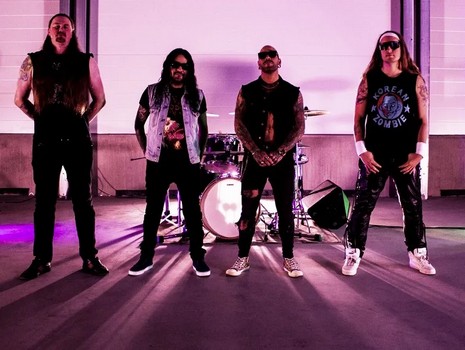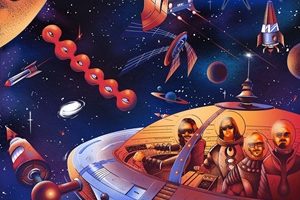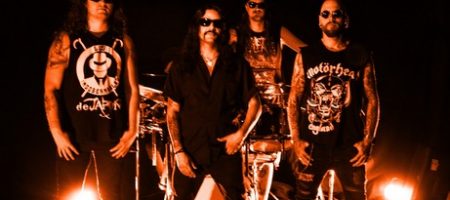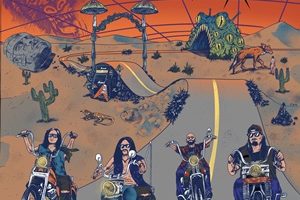Warzaw – Sending Their Regards
Thursday, 3rd February 2022
Bringing the spirit, attitude, and fun of classic heavy metal/hard rock to the underground, Warzaw are a quartet of Norwegian musicians that seek to deliver material that makes you smile, headbang, and drink your favorite beverage in homage to the music. Quickly hitting the streets again for their second album Black Magic Satellite, the songwriting, tones, and production values keep a sense of purity and honesty you do not get very much in the movement currently. We reached out to guitarist Håvard Alvarez and drummer Mats Sødahl to bring us up to speed on the evolution of the band now two records deep, references to acts like W.A.S.P., Dokken, and TNT, their DIY philosophy and thoughts on if they would seek out label support, worries about the underground venues coming out of this pandemic, and future plans.
Dead Rhetoric: As talked about at the end of our last interview for the site, Black Magic Satellite came out at the end of 2021 – allowing Warzaw to release two albums in the same calendar year. Discuss the prolific nature of the band as far as songwriting and recording – and where do you see the differences between the two records?
Håvard Alvarez: What we were hoping to do on this record is continue what we did on the first one, but just expand on it a little bit. Because everything is written so close to each other, it has kind of the same feel. It was pretty simple but has that same spontaneous feeling. That was pretty much the goal, to capture as much of that as we could on the initial writing sessions.
Mats Sødahl: The work went pretty quick for me. I wanted to keep things as fresh as possible. I didn’t listen to the songs that much before I went to record them. I wanted to keep it doing what came to me first. The first impressions of the songs and what felt right. Don’t overthink it too much.
Dead Rhetoric: There also seems to be a purity in the production and tones the band achieves record to record. Has it been important to make the songs sound as real and authentic as possible, to translate easier from the studio to the stage?
Alvarez: I can’t really say that as of yet – we’ve only played live one show because of the pandemic. The way we do things is pretty much not producing things that much. We want to keep things pretty raw.
Dead Rhetoric: Which songs on this album came the easiest for you, and were there any challenging songs to put together this time around?
Alvarez: They all are kind of challenging in a way. Most of them came pretty quick, but they took a little while to finish them off. They never are finished until the drums come in and we know how the vocals will be. It’s difficult to answer.
Dead Rhetoric: With the song “Where the Bodies Are Buried” I noticed some specific references to 80’s influences such as W.A.S.P. with the intro and the second riff reminding me of Dokken. Are those heavy inspirations for the band members?
Alvarez: Absolutely. It was Trond (Jullumstrø) the other guitar player who wrote most of that song. He is a huge fan of W.A.S.P., and Dokken especially. That’s not too weird.
Sødahl: That song definitely captured a lot of that 80’s vibe, of course in the riffs. It was mentioned to another person that this song reminded them of the band TNT – a Norwegian hard rock/metal band.
Dead Rhetoric: Ah yes – TNT. Do you have an affinity for their catalog, especially the Tony Harnell years?
Alvarez: Absolutely. We are from the same city as those guys. If you grow up around here, you can’t escape TNT. (laughs)
Dead Rhetoric: How did the cover art concept come about – as it embraces the album title coming to life? Was it a back-and-forth process of development between the band and artist to flesh out the ideas?
Sødahl: We kind of had an idea for it, in the beginning what we wanted to do was have a spacey landscape. The title actually came a little bit after. We had twenty or thirty suggestions and we ended up narrowing it down to what felt right. We ended up on Black Magic Satellite because it sounded the best out of all of them. It had a cool back story.
Alvarez: We went with the same artist as the first album. TKS Lowskill.
Dead Rhetoric: What do you think are the key elements that need to be in place for a great Warzaw song? Are you self-critical to create the best hooks, melodies, and choruses while composing this material – as it has to be hard to come up with original ideas in a style that has been around for over forty plus years?
Alvarez: The thing is that we are not trying to be that original. We really love this heavy metal style, and we write whatever we want that it suits the style. The ingredients are of a pretty simple construction, catchy refrains, and guitar solos.
Sødahl: That’s pretty much right. The idea of starting this band was to pay tribute to this kind of music with huge, double guitar solos. It comes really easy having that in the bottom. All the songs are built up easy, big choruses staying catchy, and we never forget the double guitar solos in any song.
Dead Rhetoric: And how do you feel about the growth of Daniel as a vocalist now that he is two albums in?
Sødahl: We did things a little different this time around compared to the first album. We gave him a lot more space to try and do his own thing. We had a couple of pre-production rounds at Trond’s house. He grew a lot on this album, and it’s going to come through even more on the next one.
Alvarez: This is the first album that we have written with him in the band. On the first one we had everything already written when he joined. At least he had more of a feel for this set of songs.
Sødahl: The lyrics were mostly written by Trond and Håvard, and then we would come together to rewrite things with Daniel to make things fit a little bit better.
Dead Rhetoric: When it comes to the guitar play between Trond and yourself, how do you handle the solos and parts?
Alvarez: We don’t really choose the kind of style, it’s more like, you handled the last solo on the last song, I’ll take the first solo on the next song. It’s more like trying to have as many solos as possible, the same number for each person. You just have to make something that fits.
Dead Rhetoric: How have you handled missteps or failures in bands from the past – and what have you learned and overcome from those situations to apply to Warzaw to make things stronger and more cohesive?
Sødahl: Wow, that’s a lot. We’ve done a lot of things wrong, and only a couple of things right. We have learned a lot from our mistakes. We just try to get better with it. We’ve had a couple of bad fallouts in the past, some arguments, some musical ideas and directions that were probably not right. I think it comes together better here more, in our ideas of this band. It makes it easier for every one of us.
Alvarez: I also have to add one thing. We have a lot more fun now than we did when we were younger. We take the music seriously, but we don’t take ourselves as seriously. This is not our living; we have day jobs. We want to have as much fun as possible and make music that we think is cool.
Dead Rhetoric: Do you think friendships and music chemistry are also important for the happiness of the band?
Sødahl: It makes things a lot easier – being friends as long as we have together. At least the three of us, we only met Daniel a year and a half ago. We are more comfortable with these guys than I would be with anyone else.
Alvarez: The rest of the guys probably feel this way too because there is a lot of stuff that you don’t have to talk about, you just know and you get it.
Dead Rhetoric: How do you handle the changing landscape of music consumption – as there are many older fans who prefer owning physical copies of albums still, while it seems most of the younger generation of fans prefer to get their music through digital and streaming means?
Alvarez: With this band, we haven’t made any physical copies of anything yet. But the plan is to get vinyl of both albums. Most of the people that listen to us, listen to us on Spotify. We haven’t really gotten that many requests for vinyl albums, we have gotten a couple. When we print them, it’s going to be mostly for us to sell at shows. We are not going to actively look for worldwide distribution right now.
Sødahl: The cost of making physical copies and the demand for it is way different now. CD sales are basically dead, apps on your phone and computer matter more. These physical mediums have stayed more of as collector’s items. If we had made CDs there would be thousands stacked in our basements (laughs). We don’t see the need for that right now.
Dead Rhetoric: You mention that the band is still on a DIY, independent basis with your releases. What would it take for the band to want to move up to a record deal level?
Sødahl: We’ve discussed this a little bit. But that’s mostly for distribution reasons, promotion reasons. We don’t feel we need any financial label backing for our recordings right now. For exposure, of course we would consider it. We haven’t decided yet if we want to go for it.
Alvarez: We do everything ourselves right now. For the next record we are hoping to do everything ourselves, including the mixing and editing ourselves. There is not really any point for us to go to a label now unless it’s a distribution or promotion thing that really helps us.
Dead Rhetoric: Where do you feel the state of hard rock and heavy metal are at currently? What do you enjoy most about things, and what would you like to change (if anything), especially if you had unlimited time, resources, and energy to do so?
Alvarez: That’s a difficult question to answer. Hard rock and heavy metal have become a little too similar, all the top ten bands on Spotify, they sound kind of the same, very produced. I think hard rock, at least for us, should stay a little bit rawer and more natural. Not so perfect, a little dirty.
Sødahl: I think it has to do with the consumption of the music as well. Like a lot of the top ten bands sounding the same, and most of the heavy metal and hard rock listeners like that kind of thing. The underground though, it’s healthy and strong and a lot of good bands barely have any exposures or any plays. The genre itself has a lot of good things to offer. Maybe consumer-wise there aren’t as many people listening to it as there should be.
Dead Rhetoric: How would you say Norway as a country has handled this prolonged COVID pandemic? Do you think we will have concerns about mental health and well-being coming out of this when we are able to get back to some level of normalcy?
Alvarez: Yes (laughs).
Sødahl: One of my biggest concerns about this actually is a lot of venues. It’s really hard to have a hard rock /metal venue, of medium or a small size, because everything is getting closed down. Financially for those places to keep the underground scene alive, it’s getting harder and harder to stay alive. We are down to two or three places when we had five or six going strong in the past.
Alvarez: And also, the audience wasn’t that big to begin with. There are not thousands of people coming to a local rock show here. We have maybe one hundred if you are lucky.
Dead Rhetoric: Who would you say are two / three of the musicians that helped shape your outlook and approach to your instrument – and where have you seen the biggest changes in your playing abilities over the years from your initial start to your current style?
Alvarez: Two or three guys. I listen to a lot of country and blues guitar players. My favorite one is Johnny Winter. Metal guys, Alexi Laiho as I mentioned last time. It’s difficult to pick out three. Chris Holmes in the early W.A.S.P. years. That’s where I and Trond try to be. We want to be like a mix of the blues and metal, making sort of a biker metal type of sound.
Sødahl: As for me, it’s getting harder to find any one particular guy. When I started out playing drums growing up, it was Joey Jordison of Slipknot, Vinnie Paul, and all the heavy guys. I don’t really look to other drummers for inspiration – it’s easier to copy from the drummer’s perspective. I don’t want to be too much like anyone else, I want to do what comes natural to me. The outside inspiration leads me easily to try to copy other stuff.
Alvarez: That’s what I meant earlier when I said we are having fun just being in this band. We do what we want. We aren’t trying to copy anybody, we know how to play, and we play whatever we write.
Dead Rhetoric: Has work already begun behind the scenes on the third Warzaw album – and if so, where do you see the direction going with this set of material?
Alvarez: It’s kind of early to really say anything specific. There are some ideas, and some things that have begun to take shape behind the scenes. It’s going to be heavy metal.
Dead Rhetoric: What’s on the horizon for Warzaw and its band members over the next year or so?
Sødahl: We have a couple of things on the side, nothing too certain as far as releases. There will be some things in the pipeline. I am thinking of recording something on the side, don’t have a name for it yet. The main focus is to get out there and play again with Warzaw. That’s what we really miss now, being on stage. We have a punk rock style side project thing, and we did a gig in November. That’s what feels right.
Alvarez: We have two albums and we’ve only played one show. That’s insane. We really want to get as many gigs as we can in the next months. Maybe at the end of the summer we will sit down and start working out some new material. Now we just have to play some more.

























